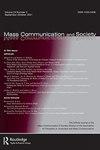迟来的贡献:民主安全中的大众传播理论
IF 2.7
2区 文学
Q1 COMMUNICATION
引用次数: 0
摘要
民主倒退在政治学中被理解为国家主导的民主制度、规则和规范的衰弱。对媒体的专制控制是威权政权巩固的核心机制。然而,大众传播理论提供了将媒体共谋概念化的方法,而不仅仅是作为恐吓和审查的工具。媒体对政治的自主和半自主的表述会影响响应性治理的能力、被统治者的同意,并最终影响民主的安全。在讨论了倒退对规范理论的影响之后,我们确定了倒退理论与大众传播之间有希望的联系点。最后,我们将概述本期特刊《媒体与民主的未来》的投稿。本文章由计算机程序翻译,如有差异,请以英文原文为准。
An Overdue Contribution: Mass Communication Theory in the Security of Democracy
ABSTRACT Democratic backsliding is understood in political science as state-led debilitation of democratic institutions, rules, and norms. Autocratic control of media constitutes a core mechanism in authoritarian regime consolidation. Mass communication theory nevertheless offers ways to conceptualize media complicity beyond serving as tools of intimidation and censorship. Autonomous and semi-autonomous media representations of politics impact the capacity for responsive governance, consent of the governed, and ultimately the security of democracy. Following a discussion on implications of backsliding for normative theory, we identify promising points of connection between backsliding theory and mass communication. We conclude with an overview of the contributions to this special issue, “Media and the Future of Democracy.”
求助全文
通过发布文献求助,成功后即可免费获取论文全文。
去求助
来源期刊

Mass Communication and Society
COMMUNICATION-
CiteScore
6.90
自引率
3.30%
发文量
58
期刊介绍:
Mass Communication and Society" mission is to publish articles from a wide variety of perspectives and approaches that advance mass communication theory, especially at the societal or macrosocial level. It draws heavily from many other disciplines, including sociology, psychology, anthropology, philosophy, law, and history. Methodologically, journal articles employ qualitative and quantitative methods, survey research, ethnography, laboratory experiments, historical methods, and legal analysis.
 求助内容:
求助内容: 应助结果提醒方式:
应助结果提醒方式:


